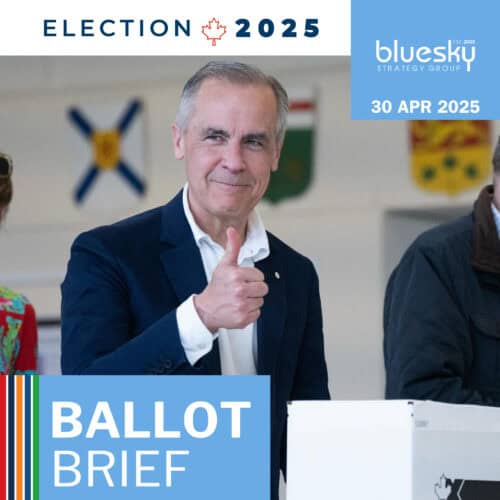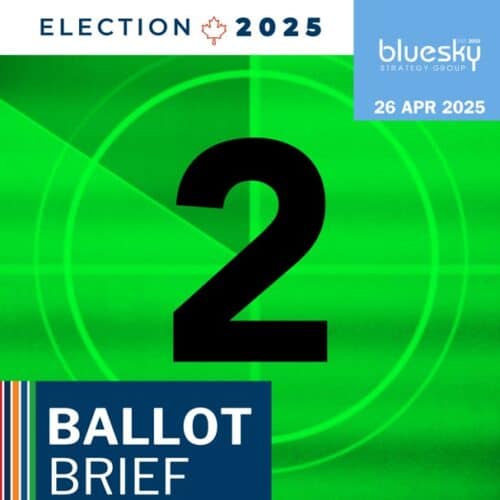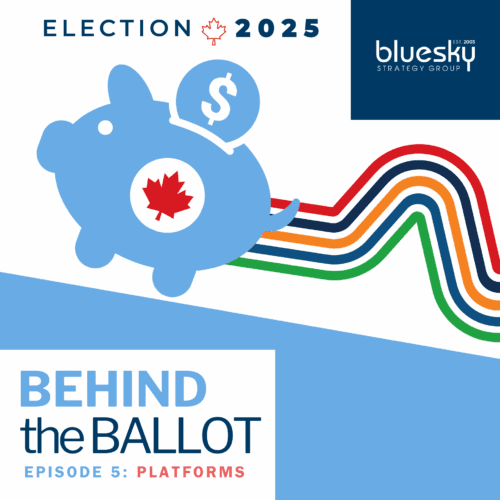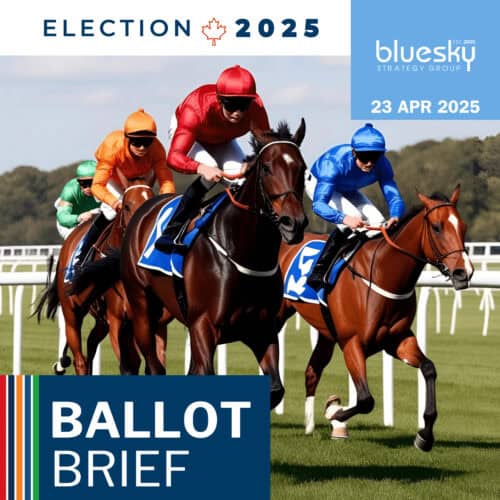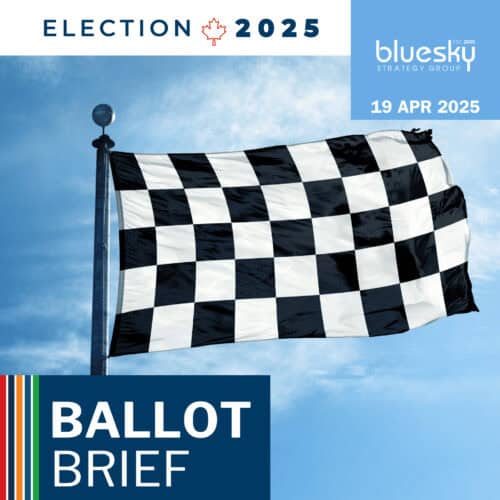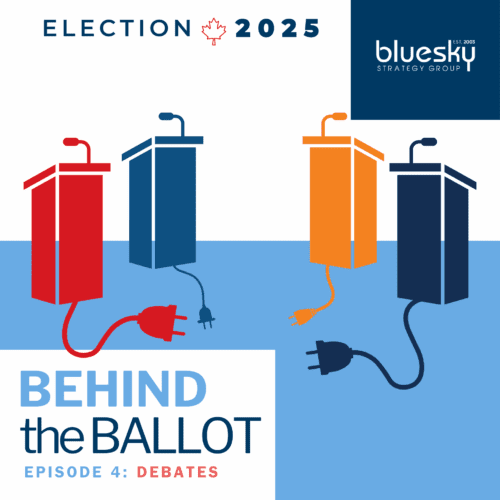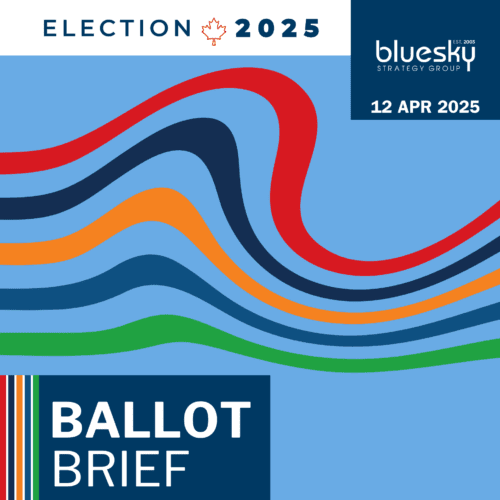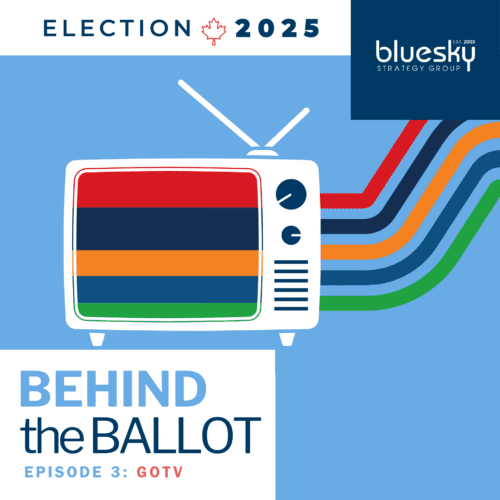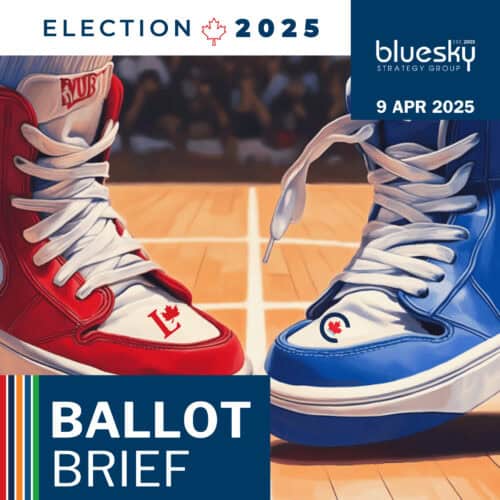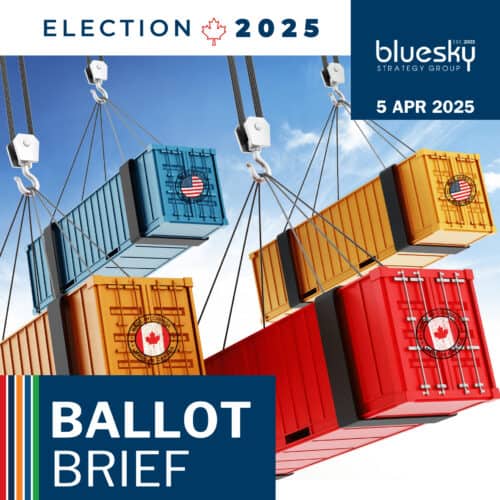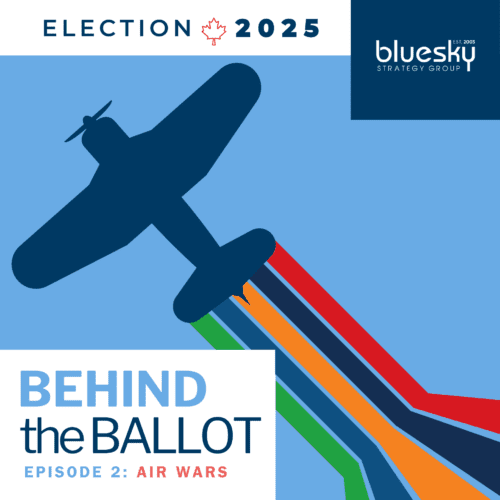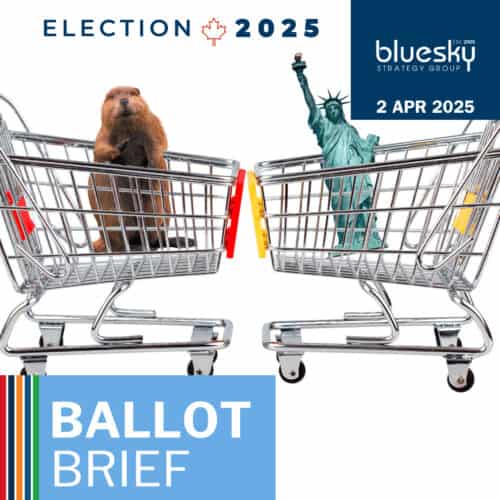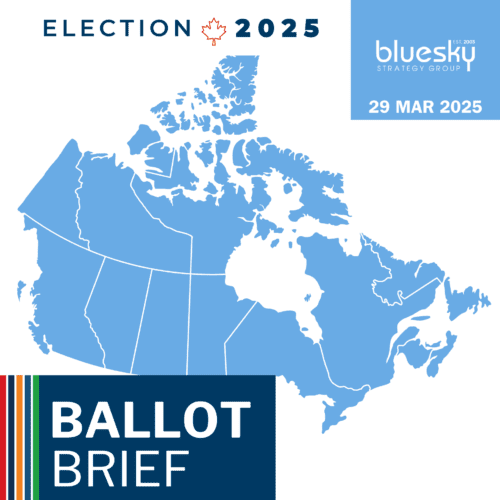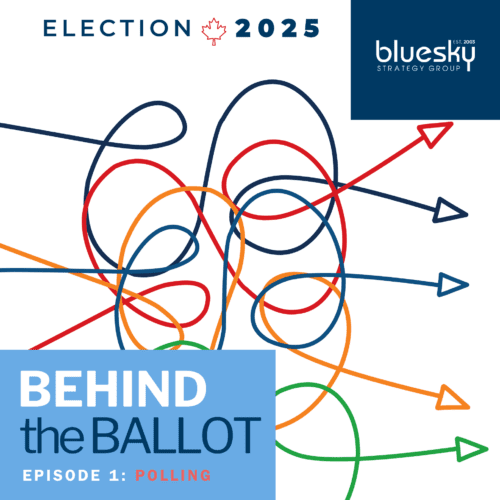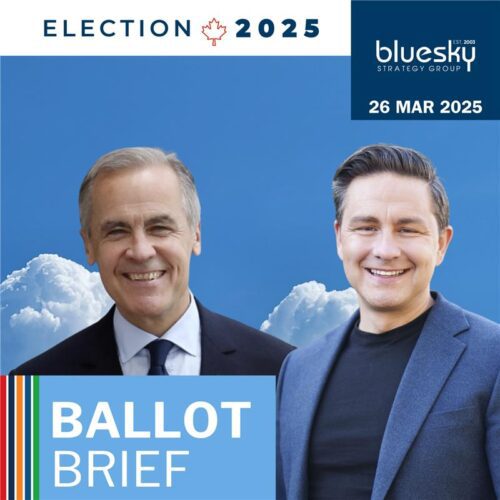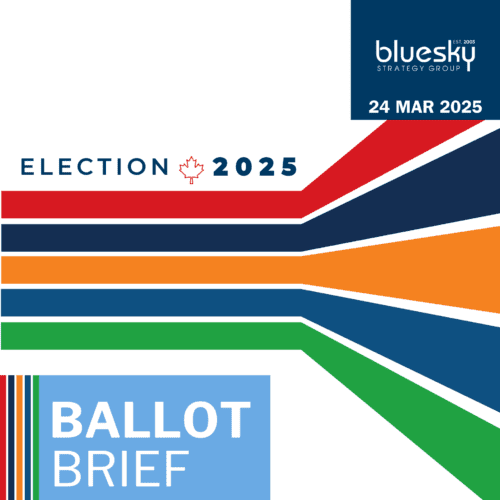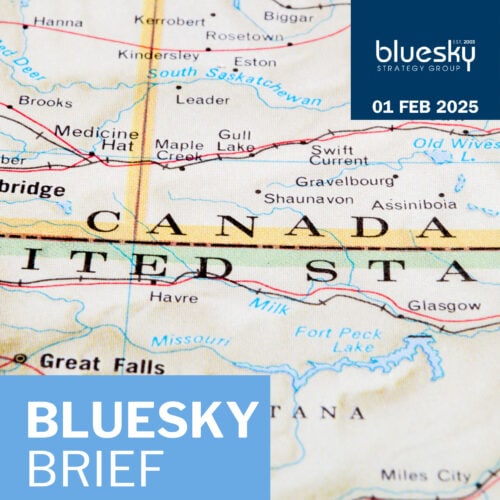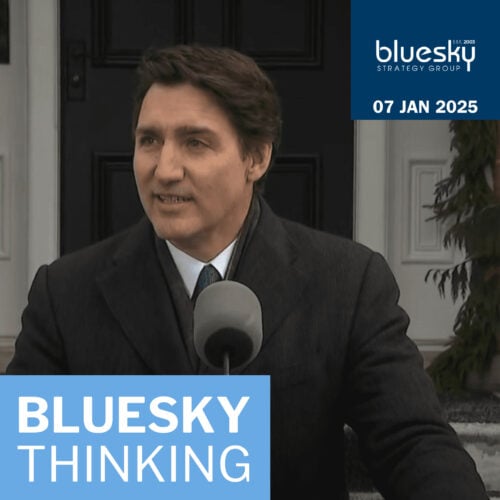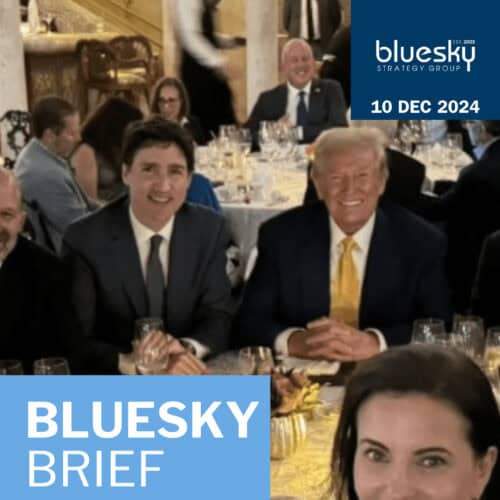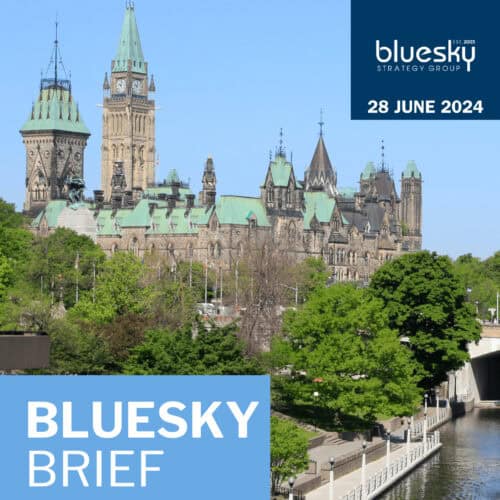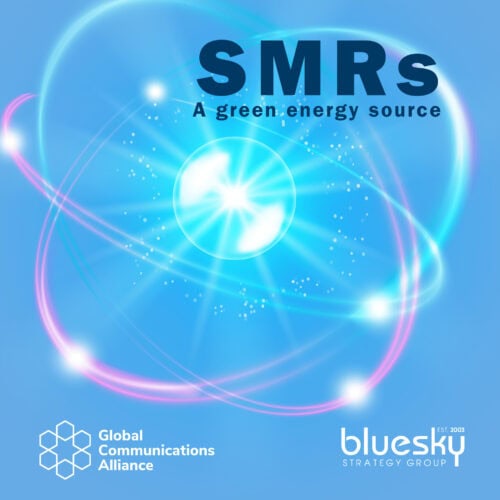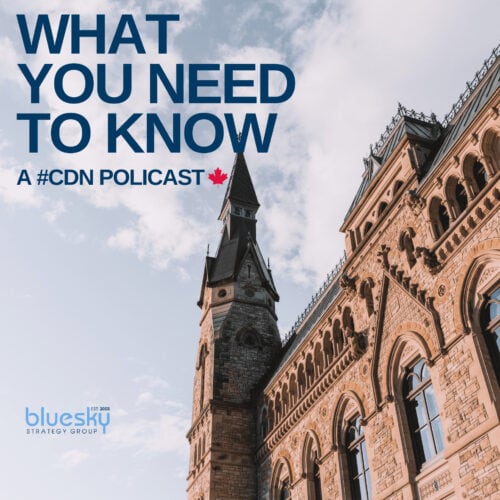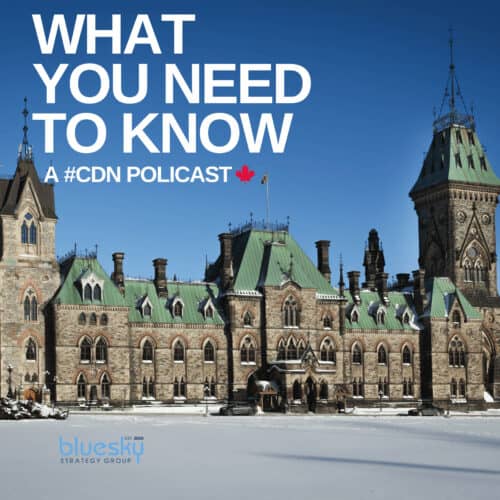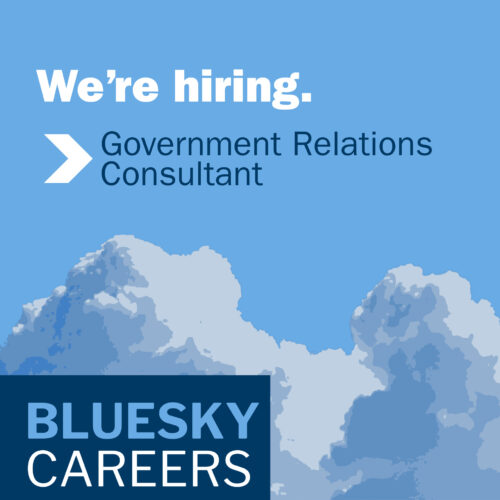Today’s Bluesky Ballot Brief was brought to you by the team of Stuart McCarthy, Geoff Turner, Janice Nicholson, Jordan Paquet, Alyson Fair, Angelo Bakoulas, Manuela Boeira and Emily Szemethy.
We have seen three days of tariff turmoil since our last brief, and the campaign trail hasn’t escaped the Trump effect. With trade tensions dominating headlines, the party leaders shifted their focus to respond … and spin.
The Rundown
Here are the latest platform planks unveiled since Wednesday as parties race to define their campaigns for Canadians against a trade war backdrop.
- Tariff Action: Liberal leader Mark Carney briefly stepped off the campaign trail again to impose 25 per cent counter tariffs on U.S. vehicles, promising that all revenues will support Canadian auto workers and supply chains, alongside new incentives for domestic production. Earlier in the week, he pledged to shield agrifood workers from Trump’s tariffs by defending supply management, expanding processing capacity, and investing in rural food sovereignty. Carney closed out the week by unveiling a significant plan to strengthen CBC/Radio-Canada and protect Canada’s cultural identity.
- Poilievre’s Push: The Conservative leader introduced a sweeping “Canada First” strategy to counter U.S. tariff threats, including reciprocal tariffs, a $3 billion Keep Canadians Working Fund to support affected businesses, and fast-tracked negotiations for a new North American trade and security deal. He also pledged to remove the GST on Canadian-made vehicles to protect jobs and drive economic growth, and introduced tougher laws on intimate partner violence to prioritize victims’ safety.
- Singh Takes a Swing: The NDP leader unveiled plans to counter Trump’s trade war by strengthening EI, capping essential costs, and ensuring that tariff revenues support workers. He also launched Canada Victory Bonds to fund infrastructure with Canadian materials and, on Friday, Singh introduced a crackdown on corporate tax avoidance to make the ultra-rich pay their fair share.
- Defending Quebec: Bloc Québecois leader Yves-François Blanchet called for a federal Wood Charter, Quebec’s inclusion in U.S. trade talks, and strong action against Trump’s tariffs — alongside a Bloc bill requiring parliamentary votes and Quebec’s approval on trade deals ahead of CUSMA talks.
- Made in Canada: The Green Party called for action in response to Trump’s tariffs, urging Canada to reduce reliance on raw exports, invest in domestic manufacturing, create strategic resource reserves, and direct pension funds to build Canadian jobs and economic resilience. The Party also supported the UN’s call to repeal expanded MAiD access, urging stronger social supports to ensure people with disabilities can live with dignity and independence.
Inside Track
- The President’s trumped-up “Liberation Day” came and went in typical grandiose fashion, but the real fallout from his economically baffling policy is only just beginning, becoming “Liquidation Days” with crashing stock markets to real-world layoffs and shutdowns. Next up: rising food and consumer prices for everyday Americans, and growing prospects of a recession at home and abroad to deepen the pain. MAGA says it’s sticking with it, but will dire consequences for voters and businesses spark a real-world reckoning leading to quick reconsideration? Trump can famously turn on a dime (never mind the damage done), or Congress can reassert its constitutional authority and revoke the misused emergency tariff powers.
- Mark Carney delivered a sober speech marking the moment when, beyond our deteriorating relationship, “the global economy is fundamentally different today than it was yesterday.” The 80-year era of U.S. economic leadership — with Canada alongside — “is over.” Carney called this tragedy “the new reality we must respond to with purpose and force,” vowing Canada would seize a new global leadership role. His chief rival delivered a pre-emptive keynote, but the contrast in gravitas was apparent and didn’t move much past his familiar stump rhetoric. As pundits and analysts are pointing out, more contrasting episodes like this will keep Conservatives locked in second place – the question remaining, by how much.
- Over the past week, the Conservatives have drawn, by most accounts, unprecedented crowds in the thousands, at rallies in New Brunswick, Prince Edward Island, Kingston, and Oshawa. Campaign officials see the large turnouts as a sign of momentum on the ground, countering national polls showing a Liberal lead. The Conservative campaign is now in B.C. for the weekend, where the Conservatives are hoping to make gains and pick up new seats. Poilievre has invested much of his time in B.C. over the past two years, and this is his second trip out this campaign.

[Source: CPC Twitter]
- Jagmeet Singh met with Manitoba Premier Wab Kinew this week, and while the two exchanged friendly handshakes, there was no public endorsement from Kinew for his federal counterparts. Meanwhile, the NDP continue to lose ground in this election, with current seat projections cutting their presence in the House in half, or worse, from the 24 seats they held in the last parliament. This may be due, in part, to NDP voters planning to vote strategically for the Liberals in ridings that swing between the two parties, to give the Liberals an edge over the Conservatives.
- Politics in the Capital: There are two politically centric conferences taking place next week in Ottawa. While scheduled long before the election was called, the right-leaning Canada Strong and Free Network Ottawa 2025 kicks off April 9 at the Westin Hotel for the Conservative crowd, and the Broadbent Institute’s 2025 Progress Summit hits the same day at the City Centre Delta Hotel for the NDP crowd.
South of the Border
While Canada may not have been the focus of the White House this week, tariffs remained the centre of discussions in Washington, with more than 50 countries impacted globally. Here are some of the things that happened on Wednesday and beyond:
- Tariff Toll: In addition to Trump’s sweeping new tariffs on April 2, which include a universal 10 per cent tariff on all imports with escalating rates for certain trade partners (not Canada), executive orders signed also included the elimination of the de minimis tariff exemption for low-value packages from China and Hong Kong. Trading partners around the globe face some of the higher rates, while Canada and Mexico largely escaped, except for previously announced tariffs and the coming into force of auto tariffs. Markets fell sharply, with the U.S. markets experiencing their worst-ever two-day performance, wiping over US$5 trillion from the U.S. stock market and a total US$9.6 trillion since Inauguration Day on January 20.
- U.S. Senate responds: Later the same day, the U.S. Senate passed a bipartisan non-binding resolution to revoke tariffs on Canadian goods, citing economic harm and diplomatic fallout. The vote reflects growing pushback in Congress, though the resolution’s fate in the House remains uncertain.
- Allies vow coordinated response: Within hours and into the following days, global leaders — including in Ottawa — denounced the tariffs as unjustified and damaging to economic stability. Countries, with the European Union members leading the charge, are discussing global efforts to move forward past U.S. protectionism. The OECD and WTO warned the escalation could derail global recovery efforts.
Hot… or Not?
- Blast from the Past: Former Reform Party leader, Preston Manning, has come out with a warning to Canadians, suggesting, “a vote for the Carney Liberals is a vote for Western secession – a vote for the breakup of Canada as we know it.” In an op-ed published in the Globe and Mail, Manning proposed organizing a “Canada West Constitutional Conference” to discuss how to operate with a new government to redress damage to the west and how to negotiate for better Canada-U.S. relations. Poilievre has come out in disagreement with Manning, sharing a message of unity for Canada.
- Ticking Clocks: In a speech about home affordability, Poilievre noted that many 36-year-old couples can’t buy affordable homes before their “biological clocks” run out. The comment was met with some criticism, including this by Jagmeet Singh, “I don’t think any woman wants to hear Pierre Poilievre talking about their body. Period.” The Conservatives have struggled in the past to connect with women voters, and this is seen by some as an illustration of why the gap exists.
- Leaders leading? While 338Canada works on a statistical model, rather than riding by riding polling, their projections offer some interesting insights, including speculation on which leaders are likely to win their own seats. While some of the projections are highly unlikely – Poilievre has consistently won his seat by a large margin, 49.9 per cent in the 2021 election – the projections are showing just how volatile this election has become. At the time of publishing, only Carney is reportedly running in a “safe seat.”
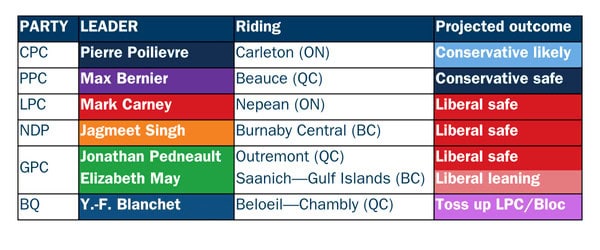
Still Behaving Badly: Liberal candidate Rod Loyola, who had been running for a seat in Edmonton, was ousted by the party after a video surfaced depicting him praising terrorist groups Hamas and Hezbollah. Loyola, who had previously been serving as an Alberta NDP MLA, left his post to run federally in March. Conservative candidate Simon Payette has been dropped for taunting the Liberal candidate on social media. Liberal Nathalie Provost, a survivor of the 1989 École Polytechnique massacre, was accused by Payette of “playing the victim game” through her work to push for stronger gun regulations. Meanwhile, Vancouver Island Conservative candidate Aaron Gunn is under fire for denying the history of residential schools. First Nations leaders in British Columbia are calling on Poilievre to drop his candidate over his racist views. Gunn made several social media posts questioning the impact of residential schools and making false claims. While the Conservative Party has already dropped five candidates this week, the party and its leader continued to express support for Gunn.
Bluesky Bonus
Give a Listen: Vice-President Jordan Paquet joined the News Day panel on Now You Know with Rob Snow Wednesday afternoon to break down the latest twists on the campaign trail.
Behind the Ballot: Missed this week’s episode of Behind the Ballot? We’ve got you covered.
In Episode 2, Vice-President Jordan Paquet sat down with former Parliament Hill reporter Teresa Wright to unpack “the Air War”— how media, messaging, and mobilization are shaping the 2025 federal election.
It’s a smart, timely conversation you won’t want to miss.
Next up on Behind the Ballot: The Ground War – April 10 at Noon ET
The air war may win headlines, but it’s the ground game that gets out the vote.
Join us for Episode 3 of Behind the Ballot as we dig into the strategies, tools, and tactics behind organizing on the ground during an election campaign—and why it still matters in 2025.
Register now and join us live on April 10.
Today’s Bluesky Ballot Brief was brought to you by the team of Stuart McCarthy, Geoff Turner, Janice Nicholson, Jordan Paquet, Alyson Fair, Angelo Bakoulas, Manuela Boeira and Emily Szemethy.

